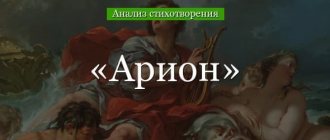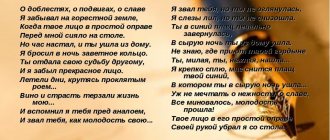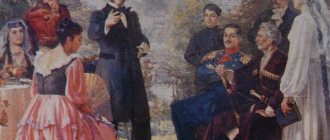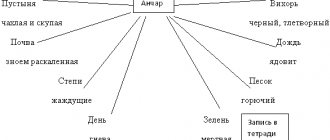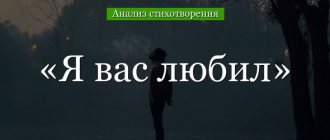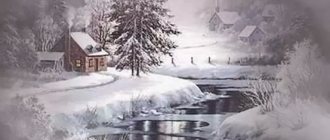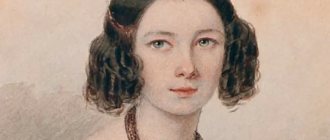Written by A.A. Blok in 1908, the poem “On the Kulikovo Field” is part of the cycle of the same name. In it, the poet reflected his thoughts about the past and future of Russia. You are offered a brief analysis of “On the Kulikovo Field” according to plan. This analysis will be useful when studying the work in a literature lesson in 9th grade.
Brief Analysis
Before reading this analysis, we recommend that you familiarize yourself with the poem On the Kulikovo Field.
History of creation - the poem was written by A. A. Blok in 1908 after the First Russian Revolution, when the poet, committed to its ideas, realized what disasters it brought with it.
Topic - Russia, since its ancient history, has been in a constant struggle for its independence, and at the beginning of the twentieth century it again found itself at a crossroads.
The composition - the poem consists of five parts, each of which has its own plot, but all parts are united by a common line - a parallel is drawn between the past, present and future of the country.
The genre is lyric-epic, the work combines some features of a poem and an epic, it has a storyline.
Poetic meter - all five parts of the work are written in iambic, the verse is divided into stanzas, each of which consists of four lines, different types of rhyme are used: exact and inaccurate, masculine and feminine, as well as a cross method of rhyming, that is, the first and third, second rhyme and fourth lines.
Metaphors - “Our path... pierced our chest”, “an arrow of the ancient Tatar will”, “sunset in the blood”, “... with a prophetic heart”, “Under the yoke of the flawed moon”, “Free clouds”.
Personifications - “The river is spread out... lazily sad and washing the banks”, “... the haystacks are sad”, “frightened clouds are coming”.
Epithets - “...a dark and ominous Don”, “quiet lightning”, “age-old melancholy”, “...a harsh cloud”, “high and rebellious days”.
Comparison - “And Nepryadva cleaned up with fog, like the princess with a veil.”
- History of creation
- Subject
- Composition
- Genre
- Means of expression
Bonus
- Poem test
Means of expression
Blok used various artistic means. These include personifications : “The river spreads out... is lazily sad and washes the banks”, “... the haystacks are sad”, “frightened clouds are coming”, metaphors : “Our path... pierced our chest”, “an arrow of the ancient Tatar will”, “sunset in the blood ", "...with a prophetic heart", "Under the yoke of the flawed moon", "Free clouds". In addition, the poet used epithets : “...the dark and ominous Don”, “quiet lightning”, “age-old melancholy”, “... a harsh cloud”, “High and rebellious days”, and a comparison : “And Nepryadva was removed with fog, like a princess with a veil "
Previous
Analysis of poems “Elegy” analysis of Nekrasov’s poem according to plan briefly - idea, genre, means of expression
Next
Analysis of the poems "Prophet" analysis of Pushkin's poem according to plan briefly - the problem, means of expression, to whom it is dedicated
History of creation
1908-1917 in the life of A. A. Blok is a period of rethinking the historical past of Russia, its present and future impending changes. The poet creates a short cycle consisting of five poems called “On the Kulikovo Field.”
The theme running through the entire work is Russia's eternal struggle for its freedom. The Battle of Kulikovo becomes a symbol of liberation from the Mongol yoke. A. A. Blok transfers the problem of the historical confrontation between Rus' and the Horde to the entire course of the country’s development, including the present, predicting a new “Battle of Kulikovo” for Russia, which will free it from the monarchy. The poet's revolutionary ideas were caused by the events that took place: the revolution of 1905-1907, the maturation of a new social explosion by 1917.
Theme of the poem
Starting the analysis of A. Blok’s poem “On the Kulikovo Field,” it is worth noting that in the poem the poet touches on a pressing issue that has especially tormented him lately: the relationship between the people and the intelligentsia. The poet connects the anticipation of events that will change the fate of Russia with memories of the Battle of Kulikovo. Blok was sure that the Mamaev Massacre was a symbolic event in the history of Russia, and they were destined to return. The significance of the Battle of Kulikovo is too great for Russia - it brought liberation to the Russian people from foreign yoke.
In his thoughts about the future of Russia, Blok uses the symbolism of the Battle of Kulikovo. He compares the approaching revolution and liberation from tsarism with the liberation of Rus' from the Tatar yoke. Continuing the analysis of the poem “On the Kulikovo Field” by A. A. Blok, we see that in the background in the poem the author raises the problem of relations between the intelligentsia and the people. He likens the camp of Dmitry Donskoy to the people - “tens of millions”, and compares the “several hundred thousand” of the Russian intelligentsia, who do not know how to find an approach to the people, with the horde of Mamai.
Composition
The cycle consists of five interconnected poems, so it is necessary to characterize its compositional content in parts. In the first part, the reader is presented with a picture from the history of Russia: the Tatar-Mongols are advancing on the country (“In the steppe smoke the holy banner and the steel of the Khan’s saber will flash…”). Blok associates the image of the Motherland with a “steppe mare” who rushes forward: “The steppe mare flies, flies and crushes the feather grass...”, “The steppe mare rushes at a gallop!” as a symbol of strength and femininity. Here the poet uses a phrase that will later become popular; it accurately conveys the author’s idea that Russia is destined to constantly defend its independence: “And eternal battle! Rest only in our dreams…" .
The second and third parts are devoted to a description of the preparation for the Battle of Kulikovo and victory over the enemy. The image of the Mother of God appears as the defender of the Russian land and its warriors: “Your face, not made by hands, was forever bright in the shield.”
The last two parts of the series are devoted to a description of modern Russia through the prism of its ancient history. The poet feels the rise of revolutionary forces, the already obvious changes in life, saying: “Again, darkness has risen and spread over the Kulikovo field.”
Genre: lyric-epic. The work combines the experiences of the lyrical hero, the features of a poem, and at the same time is characterized by the presence of a plot. It consists of five parts, which, in turn, are divided into stanzas (quatrains) written in iambic. The rhyme used is exact (pain - will), inaccurate (lazy - cliff), masculine (Rus - I'm afraid), feminine (bonfires - banner). The rhyming method is cross ABAB.
Present and future
The history of Russia gives incentive and strength to live, a great country that survived, bleeding, and got back on its feet, but received serious wounds, so it did not get stronger - “the homeland will be sick” for a long time. But the author is confident that she will survive this time too, because she has lived through more terrible times. Blok is confident that Russia is protected by an invisible force - “a face not made by hands.” The country, like a Phoenix bird, will rise from the ashes, thanks to this intercession, “it will shine forever.” Such a country can only have a great future.
In the poem “On the Kulikovo Field,” Blok’s talent as a poet-visionary was revealed more than ever. He feels that Russia will have to endure many difficulties. Again “the darkness rose and spread,” but he is proud of its strength and inflexibility - “your hour has come.” Only a huge, powerful country can endure great trials. Blok’s lines were written as if out of time, and they can be attributed not only to the 14th century, the decisive century for Rus', but also to the present. This is the prediction of the great citizen of Russia - the poet A. A. Blok.
“On the Kulikovo Field” A. Blok
“On the Kulikovo Field” Alexander Blok
1
The river spread out. Flows, lazily sad And washes the banks. Above the meager clay of the yellow cliff, the haystacks are sad in the steppe.
Oh, my Rus'! My wife! To the point of pain
We have a long way to go! Our path - the arrow of the ancient Tatar will pierced our chest.
Our path is steppe, our path is in boundless melancholy - In your melancholy, oh, Rus'! And even the darkness - night and foreign - I am not afraid.
Let it be night. Let's get home. Let's illuminate the steppe distance with fires. In the steppe smoke the holy banner will flash and the steel of the khan’s saber...
And eternal battle! We only dream of peace Through blood and dust... The steppe mare flies, flies And crushes the feather grass...
And there is no end! Miles and steep turns flash by... Stop it! The frightened clouds are coming, the sunset is in the blood!
Rapid movement
The poem contains exclamatory sentences. In combination with artistic means, they make the work more expressive and reveal the poet’s inner world. In Blok’s work one can hear pride in the homeland, which managed to rise up and defend its independence. He feels like a poet of his native country and is happy that he is involved in the great era of upheaval.
Rapid movement is an approach to death; the eternal battle in the poem is not joyful, but dramatic. Both the pace of poetic speech and the intonation structure correspond to the theme of the work. It starts slowly and calmly, then the pace increases rapidly, the sentences become short - “Let’s get home!”, “Stop it!”, “There is no peace!”
The exclamatory intonations increase - there are seven exclamation marks in seven stanzas. The author’s speech is extremely excited and this feeling is also achieved through the verse structure. Concluding the analysis of Blok’s poem “On the Kulikovo Field”, it should be noted that it is written in iambic meter, this is what gives the text a special dynamism, conveying an uncontrollable impulse and a tragic approach to death.
Analysis of Blok’s poem “On the Kulikovo Field”
Each poet in his work chooses a key theme that runs through all his works. Some people prefer landscape lyrics, others are attracted by the theme of love relationships. As for Alexander Blok, he can be classified as one of the large group of patriotic poets who are concerned about the future of Russia. It was for this reason that he refused to leave his country after the revolution, although he understood that it was heading into the abyss. However, Blok chose to share Russia’s fate, and such a decision did not surprise anyone. After all, back in 1908, the poet wrote the poem “On the Kulikovo Field,” in which he not only predicted the coming changes in the country, but also expressed his attitude towards them.
The poet’s position turned out to be clear and unambiguous - even then he decided to stay with his country and his people, although he foresaw that their fate would be quite tragic . It is no coincidence that the author in his poem draws a parallel with the Battle of Kulikovo, as if hinting that now Rus' will again have to defend itself. But not from the bloodthirsty Tatars, but from the ideologists of the coming revolution, who, for the sake of a great and crazy idea, are ready to completely ruin and destroy the country that is so dear to the poet.
It was no coincidence that Blok made such a comparison and a premonition of inevitable disaster. A few years ago, he actively supported the overthrow of the tsarist government. Believing that only in this way can Russia become a truly free and progressive country. However, after the revolution of 1905, Blok radically changed his attitude towards a violent change in the socio-political system, realizing that tens of thousands of innocent people would die in a revolutionary fire. And this, according to the poet, is too expensive a price to pay for a dubious future.
Therefore, in his poem “On the Kulikovo Field,” referring to the past, but implying the future, Blok compares Russia with a steppe mare that rushes forward towards the sunset in blood, and no one can stop her.
Realizing that inevitable changes await Russia, the poet emphasizes that “the homeland will be sick for a long time,” and asks to remember all those who are yet to die in the bloody massacre called revolution. The poet assigns himself a rather modest place in these historical events, Fr. At the same time, Blok hopes for a miracle, realizing that the upcoming battle will be much more brutal than the battle on the Kulikovo Field. If only because it will happen not with the Tatars, but with their own Slavic brothers, obsessed with rebellious ideas. “I see a wide and quiet fire over Russia in the distance,” the author predicts. However, at the same time, he does not know how to stop it, and this feeling of powerlessness gives rise to melancholy in the poet’s soul. He hopes that, as during the Battle of Kulikovo, his homeland will be saved by higher powers. Therefore, he calls on all those who want to protect the country from civil war to trust only in the will of God. “The armor is heavy, like before a battle. Now your hour has come. “Pray!” the poet notes.
Analysis of Blok’s poem “On the Kulikovo Field”
Each poet in his work chooses a key theme that runs through all his works. Some people prefer landscape lyrics, others are attracted by the theme of love relationships. As for Alexander Blok , he can be attributed to a large group of patriotic poets who are concerned about the future of Russia. It was for this reason that he refused to leave his country after the revolution, although he understood that it was heading into the abyss. However, Blok chose to share Russia’s fate, and such a decision did not surprise anyone. After all, back in 1908, the poet wrote the poem “On the Kulikovo Field,” in which he not only predicted the coming changes in the country, but also expressed his attitude towards them.
The poet’s position turned out to be clear and unambiguous - even then he decided to stay with his country and his people, although he foresaw that their fate would be quite tragic. It is no coincidence that the author in his poem draws a parallel with the Battle of Kulikovo, as if hinting that now Rus' will again have to defend itself. But not from the bloodthirsty Tatars, but from the ideologists of the coming revolution, who, for the sake of a great and crazy idea, are ready to completely ruin and destroy the country that is so dear to the poet.
It was no coincidence that Blok made such a comparison and a premonition of inevitable disaster. A few years ago, he actively supported the overthrow of the tsarist government. Believing that only in this way can Russia become a truly free and progressive country. However, after the revolution of 1905, Blok radically changed his attitude towards a violent change in the socio-political system, realizing that tens of thousands of innocent people would die in a revolutionary fire. And this, according to the poet, is too expensive a price to pay for a dubious future.
Therefore, in his poem “On the Kulikovo Field,” referring to the past, but implying the future, Blok compares Russia to a steppe mare that rushes forward towards the sunset in blood, and no one can stop her.
Realizing that inevitable changes await Russia, the poet emphasizes that “the homeland will be sick for a long time,” and asks to remember all those who have yet to die in the bloody massacre called revolution. The poet assigns himself a rather modest place in these historical events, Fr. At the same time, Blok hopes for a miracle, realizing that the upcoming battle will be much more brutal than the battle on the Kulikovo Field. If only because it will happen not with the Tatars, but with their own Slavic brothers, obsessed with rebellious ideas. “I see a wide and quiet fire over Russia in the distance,” the author predicts. However, at the same time, he does not know how to stop it, and this feeling of powerlessness gives rise to melancholy in the poet’s soul. He hopes that, as during the Battle of Kulikovo, his homeland will be saved by higher powers. Therefore, he calls on all those who want to protect the country from civil war to trust only in the will of God. “The armor is heavy, like before a battle. Now your hour has come. “Pray!” the poet notes.
It is noteworthy that the gloomy picture of devastation painted by Blok became a reality just 9 years later. But the poet chose to stay in Russia to become one of the many warriors who will try to do everything possible so that their country can rise from the ruins and once again become one of the most powerful powers in the world. True, the poet’s dreams were never destined to come true, since he did not imagine that socialism would be much more destructive for Russia than the Mongol-Tatar yoke, and would enslave the country from within for many years.
If this material does not have information about the author or source, it means it was simply copied on the Internet from other sites and presented in the collection for informational purposes only. In this case, the lack of authorship suggests accepting what is written as simply someone’s opinion, and not as the ultimate truth. People write a lot, they make a lot of mistakes - this is natural.
History of creation
The cycle of poems “On the Kulikovo Field” was written in 1908. The revolution of 1905 was left behind, but the people did not calm down, a premonition of future unrest was in the air. In the period from 1905 to 1917, Blok rethinks historical events and draws analogies between them and the present. Using the image of the battle on the Kulikovo Field, the poet shows the image of contemporary Russia, the unrest that he anticipates, and those that have already passed. He worries about the future of the country and anticipates the second wave of the revolution.
The poet was a very educated person, he knew the history of his country perfectly, so he often wrote poems based on historical motives. His patriotism is deep and emotional, because the author does not love illusions, but what he knows well. Therefore, his works about war and revolution, about ancient peoples and their connections with their descendants always evoke strong feelings.
A fine line
With this patriotism, Blok teaches from his “far” to love, be tolerant of the homeland and be content with what you have. Continuing the analysis of Blok’s poems “On the Kulikovo Field”, one cannot help but note the connection of the cycle with the article “Russia and the Intelligentsia”, in which the author writes that there are two realities that do not understand each other - the people and the intelligentsia.
A constant change of moods and battle standards occurs among hundreds of thousands. There is a roar over the city that even an experienced ear cannot understand; such a roar was also over the Tatar camp on the night before the battle. The carts behind Nepryadva are creaking, people are screaming, and geese are splashing and calling on the foggy river.
And among tens of millions there is silence and sleep. There was silence over the camp of Dmitry Donskoy, but the governor began to cry and heard how the widow was crying inconsolably, how the mother was beating against the stirrups of her son. There is a line between the two camps, the people and the intelligentsia, where both converge.
How strange it is to converge on it - here a tramp, a worker, a peasant, and a sectarian converge - with an official and a public figure, with a writer and a revolutionary. And although the line is thin, the two camps still do not want to know each other and treat those who want peace as defectors and traitors. Isn’t this line as thin as the Nepryadva River? It wound between two camps, flowed for seven nights, red with blood, on the night after the battle.
Genre, direction and size
The genre of the cycle is lyric-epic. The cycle contains a storyline that develops from poem to poem. Moreover, the text is an allusion to Russia at that time.
The entire cycle is written in iambic, but iambic pentameter, hexameter, two-foot and trimeter iambic are used, this rhythm gives dynamics to the narrative. Stanzas consist of four lines. Both exact and imprecise rhyme are used, and masculine and feminine clauses alternate. There is also cross rhyme.
Images and symbols
The entire cycle is permeated with symbols indicating the restless mood prevailing in Russia in 1908. The steppe path along which warriors gallop to the battlefield is a symbol of the metaphorical historical path along which the homeland goes. As warriors move towards battle, so the country moves towards a new revolution and civil war.
The image of a wife is no longer interpreted so simply. Even in the first part of the series, Blok, instead of the classic comparison “Mother Russia,” compares Russia with his wife. But this is not a wife in our everyday understanding, but a reference to the early work of the poet and to Solovyov’s ideas about sacred femininity. This is confirmed by the presence of a quote from Solovyov himself before the final part of the cycle. The image of a certain wife, who will have to mourn the lyrical hero after the battle, runs through the entire cycle. Thus, the final phrase of the second poem can be understood both literally, that is, “remember me later, wife,” and as “remember me, Russia.” The third poem is entirely devoted to the image of a certain beautiful woman. This could be Solovyov’s saint, or an image of Russia.
Symbols of fog and mist also run through the entire cycle . They point to the uncertainty and anxiety that have long shrouded the homeland.
The steppe mare is a whirlpool of events that drags people into carnage. This is an inexorable fate that rushes without clearing the road. The very element of war is expressed in this image.
The lyrical hero is a warrior who gallops to defend his homeland from the Tatar-Mongols. Whether the hero is a reflection of Blok himself, or is he simply an abstract character necessary to convey the main motives of the poem, is not known for sure. The poet leaves this question to the reader’s imagination.
Thus, the main characters are inextricably linked. Wife and husband are a family whose bonds are sacred and eternal. So the Russian person is forever connected with his land.
Themes and mood
The entire poem leads the reader to a feeling of anxiety, to the expectation of something bad, a bloody massacre. Blok became disillusioned with the events of 1905, he saw human cruelty and realized that this path did not suit him. In 1908, the year the poem was written, people were aware of the approaching world war and a possible new revolution. Anxiety and fear due to the unknown of the future and the premonition of approaching disaster permeate the entire poem.
Blok turns to the past, to the Battle of Kulikovo, not in order to educate people in the spirit of military patriotism, but to draw an analogy with the present. Express anticipation of big changes, show reluctance to a new bloody battle that may precede change. This allusion to the present was highly appreciated by Blok’s contemporaries.
The author, without a doubt, does not want a fight, but realizes that sometimes it is impossible to do without it. This is what happened on the Kulikovo field; the same troubled time was approaching the country during the time of the author. Sometimes war is a force of nature that cannot be stopped by the will of individuals. It is simply inevitable, but in the heat of battle it is necessary to defend the one who cannot stand up for herself - beautiful, dear and beloved Russia.
Means of artistic expression
The cycle “On the Kulikovo Field” is simply replete with interesting metaphors, and they all serve to create an atmosphere of anxiety: “our path pierced our chest,” “sunset in the blood,” “age-old melancholy,” and so on. Numerous personifications (“the haystacks are sad”) and epithets (“he is lazily sad”) serve the same purpose.
An interesting comparison is also used, which stands out against the background of other means of artistic expressiveness and once again refers us to the image of Solovyov’s lady: “The princess did not clean herself with fog like a veil.”
Russia's past
To understand Russia's present and foresee its future, the author turns to the country's long past. “On the Kulikovo Field” is an example of Blok’s patriotic lyrics; here the poet merges with the lyrical hero. And it is impossible to distinguish where the author expresses his feelings and where he speaks on behalf of the hero. The poet presents the image of Russia in the form of a wife and a beloved woman - “My wife!” Such an attitude towards the fatherland is found only in Blok’s works. The author strives to unravel and understand the source of the homeland’s strength. But this is impossible, she is incomprehensible, and this makes her even more beautiful.
